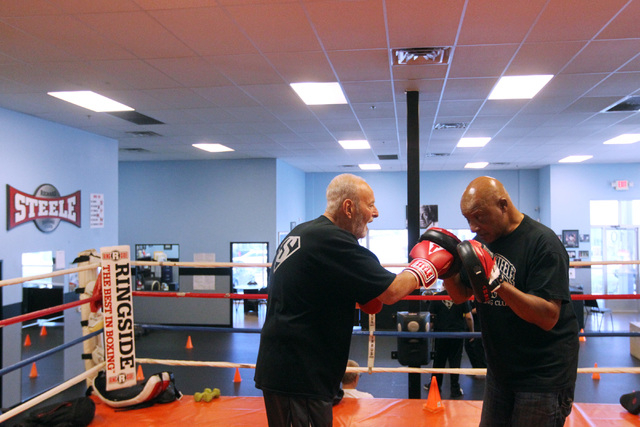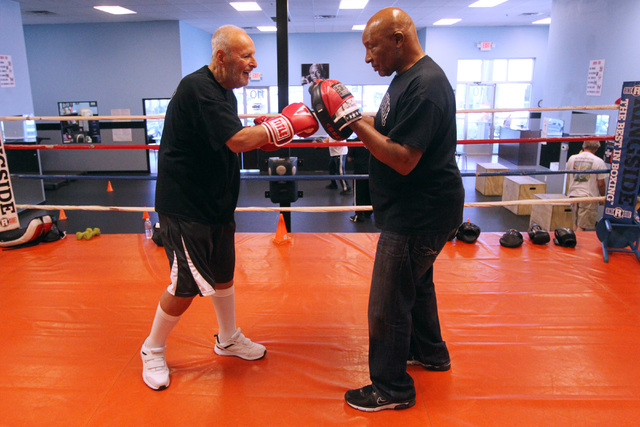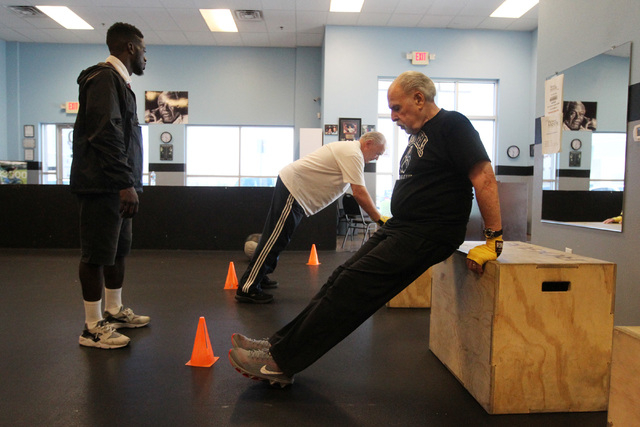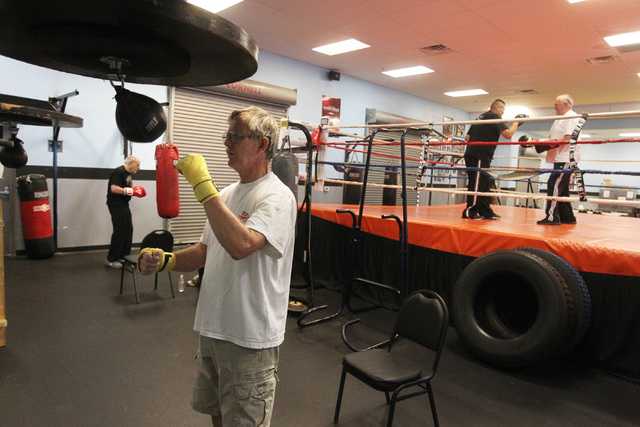Concierge doctors aim to address Southern Nevada patient complaints






Medicine might not be the first thing that comes to mind when you think of services provided by a concierge, especially in Las Vegas, where the right people can open the ritziest doors and lift the most exclusive velvet ropes.
Concierge doctors make up a small minority of the hundreds of primary care and family practice physicians in Southern Nevada, but they address some of the biggest patient complaints: feeling rushed during appointments, long waits to see doctors and incomplete explanations of medical problems or test results. Some people might be shocked by the up-front costs involved, an annual expense of $1,500 to $3,000. Some U.S. concierge doctors charge up to $30,000 per year.
Concierge doctors say those so-called out-of-plan fees allow them to provide more personalized care to their patients, including giving their cell numbers to their patients so they can call whenever thy have a question. Critics say the system provides superior care for a select few but worsening services for those who can’t afford to pay the up-front costs.
Jim Nagourney, a former New York Mets and New York Islanders executive, was disappointed earlier this year when his primary care physician, Dr. Evan Allen of Henderson, announced he was changing his practice to a concierge model.
“For me, it doesn’t make economic sense,” Nagourney said. “What do I go there for mainly? To be referred to a specialist.”
For others, the outlay to their concierge doctors each January is their most important medical expense of the year because they gain priceless access to medical providers.
Robert Spencer, 83, an eight-year resident of Las Vegas, praises the service he gets from Dr. Justin Terry of Henderson, one of the Southern Nevada physicians who contracts with MDVIP, a Florida-based company that operates the largest U.S. network of concierge doctors. MDVIP charges its physicians a per-patient royalty fee, usually $500, for marketing, branding and other services. Terry is available without delay when Spencer needs medical attention.
“You know he’ll always call you back,” Spencer said. “You know you’ll always get in either that day or the next.”
Under MDVIP’s model, a doctor would have up to 600 patients to pay the up-front cost, typically $1,500, which works out to $900,000, with $300,000 going to the company in royalty fees. That compares with family practice physicians in a traditional fee-for-service clinic who might have 2,500-5,000 patients per year, with up to 30 appointments per day. For concierge doctors to be successful, they must have the bedside manner of Marcus Welby, M.D., the character played by Robert Young from 1969-1976 in the TV show of the same name, about doctors treating people as individuals in an age of specialized medicine and uncaring physicians.
FLAT FEE FOR SERVICE
Nagourney and Spencer take part in weekly workouts for patients with Parkinson’s disease at Hall of Fame boxing referee Richard Steele’s Boxing Club in Las Vegas. The sessions, developed in conjunction with the Lou Ruvo Center for Brain Health, target the movement disruptions Parkinson’s patients experience such as tremors, stiffness and a slowing gait.
Steele and his family were taken care of by Dr. Elias Ghanem, the Las Vegas doctor to Elvis Presley, Wayne Newton and other stars who practiced concierge medicine long before the concept was widespread.
In March, Nagourney’s doctor Allen began working full time in a wellness center he created about a year ago in conjunction with his Total Care Family Practice. Patients wanting a concierge medical experience pay an $1,800 annual membership fee for services in the wellness center. Total Care Family Practice continues to operate as a traditional fee-for-service doctor’s office with physician assistants seeing patients.
“It’s a flat fee for a flat service,” Allen said of his wellness center. “A patient who joins as a member has an unlimited number of visits and can be seen whenever necessary.”
Wellness center patients can receive services even if they cannot get to the office. Allen continues to serve as medical director of Total Care Family Practice and can be called by the physician assistants for a consultation when needed.
Concierge Medicine Today, a trade publication, estimates some 5,000-6,000 concierge doctors have between 1 million and 1.2 million patients in the United States. That sector of the free market health care delivery system continues to grow at a modest rate since its inception in the mid-1990s, magazine editor Michael Tetreault said. Concierge medicine has evolved, and no longer is the practice limited to well-heeled patients. Even people on fixed incomes and modest means seek the extra attention and access concierge doctors provide.
Physicians considering the move to concierge medicine are drawn by the freedom they achieve breaking away from having their compensation tied to reimbursement rates for patient visits, prices set by government agencies, insurers and health maintenance organizations.
“Doctors are tired of working for less and doing more, and that’s just not good for patient care,” said Dr. James Anthony, a Las Vegas primary care physician and member of the state Board of Osteopathic Medicine who has considered starting a concierge practice many times.
Anthony covets the increased access and time he would have with his patients if he practiced under a concierge model. Ideally, fewer patient symptoms will be missed and better diagnoses would result when doctors and patients are afforded more time together, Anthony said. Patients also can get an appointment in a day or two, and they often can talk with their doctor immediately if they call the office.
“By contrast, in conventional fee-for-service medicine, you might not get in for weeks, and you probably won’t be able to talk to the doctor if you call after hours,” Anthony said.
‘JUST LISTEN’ TO LEARN
Other doctors shy away from the concierge model because some patients are priced out of the system. Patients of Dr. Robert Kaplan, a Las Vegas general practitioner, say he offers concierge services without the concomitant charge, spending as much time as necessary to hear their complaints and address their health challenges.
“You can really learn a lot about people if you just listen to them,” Kaplan said.
He has had opportunities to join concierge medicine but continues to practice in much the same way he did when he started in the 1970s.
“I’ve refused that many times. I just don’t believe in it,” he said. “I grew up in a time that doctors would come to your house. I get paid to do my job, and I don’t think I should be paid extra to do my job.”
Kaplan admits he has more financial security than other doctors, especially those newly licensed. He invented the knife block, the kitchen counter accessory that holds cutlery, and his company was producing the blocks for the J.A. Henckels Co., which eventually bought his company for a hefty sum. He continues to practice medicine the old-fashioned way, even though he had the means to retire in his late 30s.
“Practicing medicine by the cookbook that’s being followed today, I don’t believe in that, either,” Kaplan said.
Terry, the concierge doctor praised by Spencer, the Parkinson’s patient, is the son-in-law and partner of Dr. Russell Neibaur, who has contracted with MDVIP since 2004. Neibaur practiced for 17 years in Las Vegas before changing his practice model to concierge medicine, and he decided to make the change because he had confidence his patients were loyal enough to support him. Patients who see Neibaur and Terry recently saw their annual out-of-plan fee raised from $1,500 to $1,650.
If you find Neibaur in MDVIP, the website says he is at patient capacity, and Terry’s practice is filling up even though he joined the clinic less than a year ago.
“The public is aware of this style of practice, and they’re seeking it out,” Neibaur said.
Concierge medicine doesn’t mean less work for the doctors, Neibaur said, because workdays are just as long as ever. The key is the amount of time he can devote to each patient to discuss test results and consult with specialists, the type of follow-up work that can get short shrift in a traditional doctor’s office.
“The stress level is different. It’s not like you’re always two hours behind,” he said. “There’s time to make sure everything gets done that day.”
Dr. Robb Rowley, an independent Las Vegas concierge doctor, limits his patient pool to 200, and they each pay $2,300 per year. Rowley is a proponent of personalized medicine to provide the right treatments at the right time, every time, to the right person. Concierge medicine allows him to achieve those goals, and the relationships he builds often become as strong as bonds he has with family members.
“When I lose a patient, I grieve a ton more than I did before,” Rowley said. “That’s the hard part of it.”
With physician and patient dissatisfaction with the U.S. healthcare system growing, concierge medicine will continue to expand, doctors say.
“The satisfaction is amazing,” Neibaur said. “It resurrected me from burnout.”
Contact Steven Moore at smoore@reviewjournal.com or 702-380-4563.


















